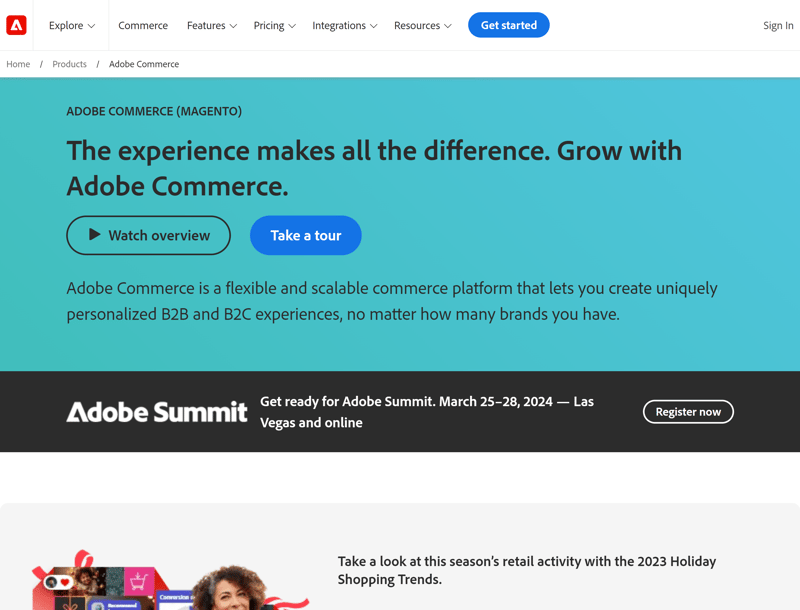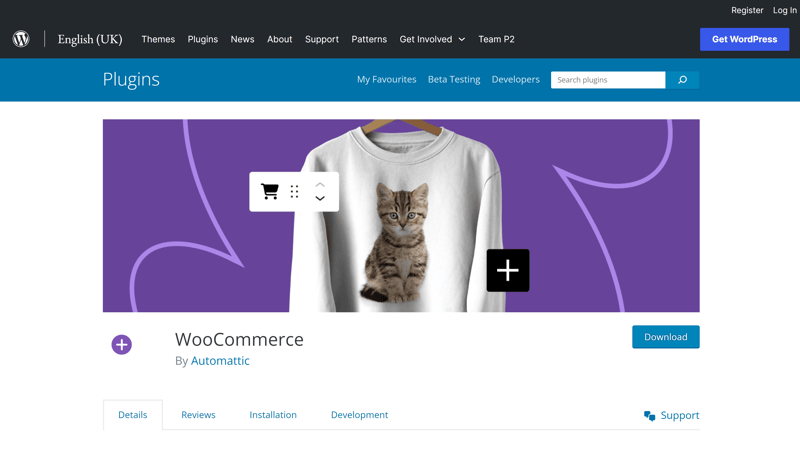Ecommerce Website Cost: How Much Is It Really?
Opening an online store is a bit like building a house: how much it costs depends on what you're prepared to do yourself versus what you'd prefer to outsource to professionals. There are many ways to create an online store, and each has a different price point.
In this article, we'll explore the costs associated with starting and operating an online store. We'll outline the costs of different methods and highlight some additional expenses you might not have considered.
Above all, it's important how you plan to create your online store. You could program a website from scratch, but this requires substantial technical knowledge and time, making it impractical for many.
That's why most online business owners rely on dedicated ecommerce platforms. But even those come in many shapes and sizes.
Cloud-Hosted Ecommerce Platforms: Costs of Using Shopify & Co.
Cloud-based ecommerce platforms like Shopify or Wix eCommerce are probably the most beginner-friendly way to create an online store. Best for small businesses and those just starting out, they provide a quick, easy, and low-cost method for opening a digital shop.
Platforms like Shopify provide a range of design templates, pre-made content blocks, and user-friendly editors. These features enable you to tailor your store's look and organize content with ease, all without needing coding skills. The trade-off is that these platforms aren't quite as versatile and feature-rich as more advanced ecommerce platforms.
Advantages and Disadvantages of Basic Ecommerce Platforms
Beginner-friendly
Designed for beginners, these platforms are intuitive and don't require coding skills. Anyone can create a well-functioning and visually appealing online store.Low cost
These cloud-hosted solutions are usually quite affordable, with various budget-friendly plans available.Maintenance and security included
When you use a cloud-based ecommerce platform, your provider handles all technical maintenance and security updates, saving you time and resources.
Fewer customization options
Beginner-friendly options are less flexible when it comes to customization and functionality.Provider dependence
Your store's capabilities are tied to what the provider offers - the same goes for aspects like stability, quality, and security standards.Limited scalability
You may encounter limitations as your business grows or becomes more complex.
Subscription Costs for Basic Ecommerce Platforms: Starting at $18 per Month
Costs always depend on the provider and plan chosen. Broadly speaking, though, cloud-based ecommerce platforms are the most affordable option, bundling the platform, hosting, and domain costs.
Prices for starter plans vary. Among the providers we reviewed, monthly fees range from $18 to $32, or $216 to $384 annually. However, basic plans are typically limited in terms of functionality and/or the number of products that users can add to their stores. When comparing subscriptions, make sure that the plan you choose meets all of your requirements.
Here's a list of the most affordable rates from each of the ecommerce platforms we've reviewed:








Remember, the monthly or annual subscription fee isn't your only expense. You can read more about additional costs below.
Cost of Building Your Store
The costs outlined above only give you access to the platform and its services. You still need to set up your store, which requires either a time or a monetary commitment. Basically, you have two options:
Option 1: Build an Online Store Yourself
If you build your online store yourself, you don't need to worry about any additional direct costs. You will, however, need to invest quite a bit of time and energy. While platforms like Shopify are easy to use, patience and a good eye for design are essential if you want to achieve solid results.
To create a basic online store, you should set aside at least 32–56 hours. In the guide linked to below, we show you how to set up a store with Shopify:
Option 2: Have a Professional Build Your Store for You
Alternatively, you can hire a pro to build your online store for you. You can either go with a freelancer or commission an agency — prices for either vary considerably.
A professional freelancer based in the US or Canada will likely charge anywhere from $3,000 to $10,000 for an online store built with an ecommerce platform. Agencies are typically more expensive, with prices from $5,000 to $20,000.
As a rule of thumb, the larger and more complex your store is, the more expensive it will be.
You can ready more about hiring pros to build your online store for you in our guide here:
Examples of Basic Ecommerce Platforms
There are plenty of user-friendly ecommerce platforms. Here are some of the popular options we've reviewed:
Wix eCommerce: Beginner-Friendly Store Building Solution
Wix* eCommerce is a highly versatile ecommerce platform built around the company's powerful website builder.
The platform focuses on user-friendly customization: You'll be able to design your digital storefront by dragging and dropping elements, eliminating the need for technical or coding know-how. On top of that, Wix eCommerce includes excellent product management features and well-developed marketing tools.
All of the above makes Wix a great option for smaller online stores as well as regular websites that want to add ecommerce features. For larger and more complex stores, though, dedicated ecommerce platforms like BigCommerce or Shopify are a better choice.

Shopify: Scalable All-Arounder for Online Stores of Any Size
Shopify* is one of the world's most popular ecommerce platforms. By the company's own estimates, the Shopify solution 10% of the entire US ecommerce market. The platform is a good all-rounder, serving smaller businesses and startups as well as larger ecommerce projects equally well.
Shopify shines with its robust product and sales management capabilities. The platform enables you to craft a well-organized product catalog, complete with numerous variations and categories. Plus, its smart automation features are excellent for efficiently processing and sorting new inventory.

BigCommerce: Powerful Platform for Large and Growing Stores
BigCommerce* powers a number of prominent online stores, such as SkullCandy, Ted Baker, and Ben & Jerry's. As its prominent list of clients shows, BigCommerce can easily handle complicated, highly customized ecommerce projects. This makes the platform a solid option for larger or more well-established businesses, as well as those that would like to reach that point someday.
BigCommerce offers extensive product management tools and supports a wide array of product variations and settings.

Self-Hosted Ecommerce Platforms: Costs of Using Advanced Solutions
For larger businesses or more demanding projects, self-hosted ecommerce platforms like Adobe Commerce (Magento), Oxid eShop, or WooCommerce are a better option. These offer more features and customization — but they also require greater technical know-how.
Advantages and Disadvantages of Self-Hosted Ecommerce Platforms
Highly customizable
Advanced platforms offer more flexibility when it comes to designing your store, which can be customized entirely to your needs (as long as you've got the skills to back up your vision).Enhanced scalability
Designed for growth, these platforms can be adapted to suit the evolving size and complexity of your business.More control and independence
With open-source solutions, you have full control over every aspect of your store, from server selection to coding.
Technical know-how required
These platforms typically require significant technical expertise or external consultants for setup and maintenance.Time and cost-intensive
Setting up and customizing these platforms can be time-consuming and costly, especially if you hire professionals.Maintenance and updates
When you use an open-source solution, you're responsible for maintenance and updates, which can be both time-consuming and expensive.
Basic Costs of Self-Hosted Platforms: Open Source vs. Enterprise
The costs for professional platforms like Shopware, WooCommerce, and OXID eShop vary significantly and depend on numerous factors. Plus, while many are open-source and free to use, the same providers often offer paid enterprise solutions with enhanced features and support.
Pricing Model 1: Subscription and License Fees for an Enterprise Plan
Similar to cloud-based platforms, enterprise plans come with a monthly or annual fee, typically including hosting and other services, but at a higher cost than basic cloud-based options.
License fees and subscription costs vary from provider to provider and can range from several hundred to thousands or tens of thousands of dollars per year. Some providers charge based on how much business your store does.
Pricing Model 2: Hosting and Domain Costs for Self-Hosted Stores
If you opt for an open-source solution, you'll need to manage hosting and domain costs, along with setup and maintenance expenses. Many providers offer special ecommerce plans and even tailor their offers to specific platforms.
Hosting and domain costs vary by provider and subscription, however, you can expect to pay $5 to $100 per month for hosting and $10 to $20 per year for a domain.
Cost of Building Your Store
Again, you can either set up your self-hosted store on your own or to leave it up to a professional.
Option 1: Build It Yourself
Since self-hosted ecommerce platforms tend to be a lot more complex than their cloud-based counterparts, it usually takes much longer to familiarize yourself with the platform and build your store.
Average users should expect to spend approximately 2 to 4 weeks to build a basic online store using a self-hosted ecommerce platform. This includes software installation, store design, setup, creation of product pages, and specifying payment and delivery options.
Option 2: Have Pros Build Your Online Store for You
When hiring freelancers or agencies to build your online store on a self-hosted platform, you'll find that the costs can vary widely. This is generally due to the complexity of these platforms and the specialized expertise required to navigate them.
A small shop might cost anywhere from $5,000 to $25,000. On professional platforms like Adobe Commerce, a large store with custom features and settings can cost upwards of $100,000.
Examples of Self-Hosted Ecommerce Platforms
Like with basic ecommerce platforms, there's a wide range of self-hosted options available. Their prices vary a lot, depending on the provider and the type of subscription or pricing model they offer.
Here's a look at some well-known self-hosted services and their costs:
Adobe Commerce (Magento): For Medium-Sized to Large Stores

Adobe Commerce is a popular ecommerce platform for larger stores.
Previously known as Magento, Adobe Commerce is a powerful ecommerce platform designed for medium-sized to large online businesses. Three subscriptions are available:
Magento Open Source: This version is free, but you'll have to pay for hosting, domains, development, maintenance, and all other costs.
Adobe Commerce Pro: This plan includes cloud infrastructure, staging and performance monitoring tools, and automatic backups. The exact price depends on your store's annual turnover — you can expect to pay at least $20,000 per year.
Adobe Commerce Managed Services: This plan includes everything in the Pro subscription plus additional managed services like customer success engineering and escalation management. Again, the exact price depends on your store's sales, typically starting around $40,000 per year.
WooCommerce: WordPress Plugin for Small to Medium-Sized Shops

WooCommerce is the most popular ecommerce plugin for WordPress.
Looking for a more affordable option? In that case, WooCommerce might be worth a look. This widely-used ecommerce plugin for WordPress is generally free, you'll only pay for hosting and your domain.
For hosting, you might want to consider a managed WordPress solution, which costs around $10 per month. If you need ecommerce-optimized hosting, prices begin at about $50 per month. Some hosting services even offer special WooCommerce hosting rates.
Additional Costs
Beyond the costs of the platforms and setting up your store, online business owners should also consider various other expenses. These can vary significantly, depending on factors like the fees charged by different providers and the nature of the products or services you're selling.
Here is a quick rundown of some other expenses you may need to account for:
Category | Description | Cost (estimated) |
|---|---|---|
Payment fees | Also known as transaction fees, these are charged by payment providers like PayPal, Stripe, or credit card companies. They vary by provider and can either be charged as a percentage or a fixed fee per transaction. |
|
Product costs | The costs associated with creating the products that you will sell, including raw materials, production, and storage. |
|
Running costs and logistics | These include storage, packaging, delivery, and return costs. They depend again entirely on your business model and the type of products you sell. |
|
Design and content | Creating product photos, descriptions, website copy, and design elements is best left to the professionals. Unless you can manage everything yourself, you'll need to hire professional photographers, designers, and copywriters. |
|
Marketing | All online marketing activities, such as search engine optimization (SEO), pay-per-click ads (PPC), social media marketing, and email marketing. |
|
Themes and plugins | The costs for additional themes and plugins that enhance the functionality and look of your online store. |
|
Conclusion: Every Online Store Is Unique
How much does an online store cost? Because every store is unique, there's no one right answer to this question. It all depends on factors such as:
the underlying ecommerce software (cloud-based or self-hosted?)
the method of creation (DIY or a hired freelancer/agency?)
the size and complexity of the store
the projected annual sales
the kinds of products offered
For a small store built by yourself using a SaaS cloud platform like Wix or Shopify, you should set aside $20-$40 per month, plus some extra for operating costs like transaction and storage fees. However, if you're looking to have a professional design your store, costs can range from $3,000 to $20,000.
For larger stores on self-hosted platforms like Adobe Commerce, monthly expenses can be much higher. Based on your annual sales, you might spend about $2,000 per month or more. Professional development for such platforms can start from $5,000 to $25,000, and for a large store, this could exceed $100,000.
Remember, these are just estimates. The good news is that there are suitable options for any kind of budget these days. You can learn more and read comprehensive reviews in our comparison of the best ecommerce solutions.

















